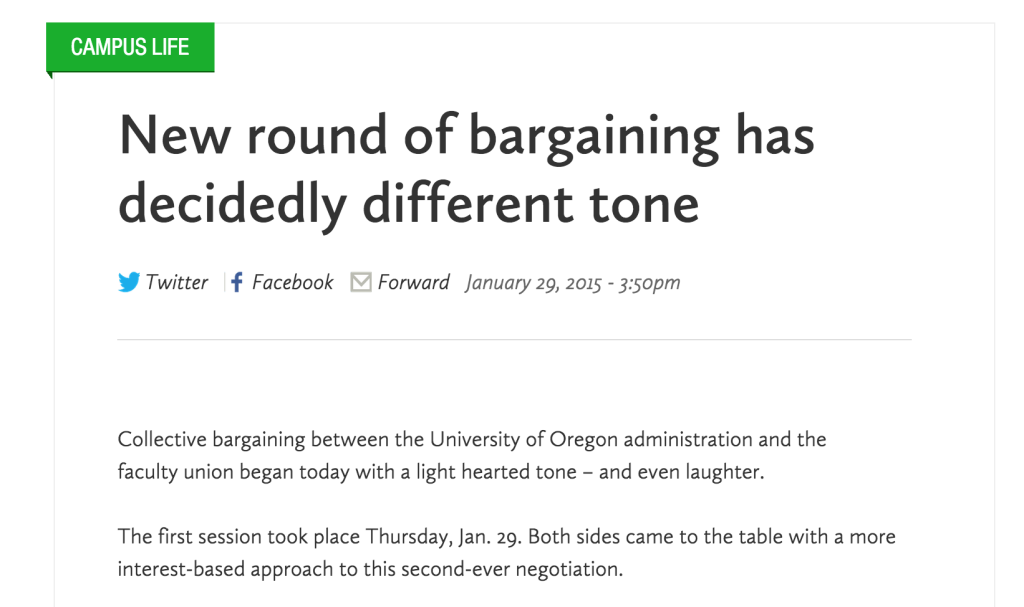Tobin Klinger, UO’s $115K Deputy Strategic Communicator, has a rather saccharine-sweet report on Session I in “Around the 0”:
Maybe the rest of Mr. Klinger’s post has content. I wouldn’t know, I barely made it to the toilet. Jennifer Winters’ report on last week’s Senate meeting is even worse. Some might even call it sophomoric.
Speaking of which, last week UO’s official, expensive, and heavily spammed “Around the 0” blog had 14,599 page views. UO M had 36,367. I’m upgrading the server, sorry for the 503 errors in the meantime.
The United Academics Faculty Union’s report on bargaining session I is here. The full text is below, plagiarized from David Cecil. For live-blogging of Session II, try the UAUO Facebook page, here.
Bargaining Update – February 2, 2015 by David Cecil
Bargaining toward our second collective bargaining agreement kicked off last Thursday morning at 10 am in the Collaboration Center of the Library. That is also where most future sessions are scheduled to meet. You can check for specific days, times, and locations at the Events Calendar at the bottom of the home page.
Our team opened Thursday’s session by inviting the administration’s representatives to consider the following questions while thinking over our proposals:
- What if we accepted this proposal? What are the negatives? What are the positives? How can we heighten the positives and minimize the negatives?
- What if we dedicated ourselves to ensuring all faculty could participate in shared governance?
- What if our faculty knew that if they did a good job they would always have a job at the university?
- What if our policies and procedures were transparent so that all faculty knew their rights and obligations?
- What if we did everything we could to prioritize excellence in undergraduate and graduate learning, excellence in research, both basic and applied, recruiting and retaining the best faculty we can?
If you would like to read our proposals in full, you can find them at the United Academics website, under the “Bargaining” tab.
Here are some highlights:
Equity: We proposed language that would clarify the rights and obligations of all faculty to participate in internal governance and proposed a mechanism whereby faculty could suggest modifications to unit policies (Article 4).
We proposed that all faculty – including faculty at less than .50FTE – have access to fringe benefits like parking permits and bus passes (Article 28).
We proposed that the Union and University Administration work with the UO Foundation to develop a fund to subsidize child care for UO faculty; our plan is modeled on the program atOregon State University (Article 28). We envision this as a multi-year project culminating in an effective subsidy for faculty.
We proposed a sick leave bank for all faculty and that adjuncts and postdocs can no longer be barred from access to parental leave (Article 32).
Stability: We made several proposals to amend the article on Contracts (Article 16), the biggest of which is our renewed effort to secure an expectation of continued employment for Career NTTF. Currently, the administration can decide not to renew a Career NTTF for any reason. We proposed limiting the Administration’s right to non-renew to four reasons – poor performance, lack of funding, programmatic or curricular needs, and the desire of a unit to replace the NTTF position with a TTF position.
We also proposed that all notices of appointment or reappointment, including FTE and salary information, must be made by May 15 of each year and that those appointments cannot be reduced or rescinded, except through the discipline procedure. We want binding contracts in faculty hands in plenty of time to prepare for the coming academic year.
We also proposed limits in the number of ongoing Adjunct positions a department can have at any one time. Our goal is to convert as many Adjunct positions to Career NTT positions as possible.
Elsewhere in our proposals, we sought to expand the circumstances under which faculty would be able retain coverage under PEBB. The details are complicated, but essentially we are seeking to provide coverage for faculty who have dips in FTE below .50 FTE or don’t have an appointment for a term. We are also seeking to extend summer coverage to all faculty who have coverage during the regular academic year (Article 27).
Lastly, we sought to provide more funds to support mentoring and retention programs for newly hired and under-represented tenure-track faculty (Article 35).
Transparency and Voice: In addition to the work we did in Article 4 to increase faculty participation in internal governance, we proposed extensive revisions to the tenure denial appeals process. All of our proposals were designed to restore and enhance faculty rights through this difficult process and to make the rules more transparent (Article 21).
We proposed that Human Resources design and implement a new webpage that will enable faculty to track their eligibility for leave and to help them get access the proposed faculty leave bank (Article 32).
Economics: We are not going to give the University Administration a salary proposal until later in February so that we have a chance to address some of these important non-economic proposals first.
Our proposals are meant to advance the improvements to the University of Oregon that we achieved in the first round of bargaining in 2013. Our first CBA left a few things undone; the process of implementation, moreover, revealed several areas where clarification was needed. Our proposals aim to fix what needs fixing, to add improvements, and to continue the mission of building a better university.
Questions? Feedback?
The Collaboration Center is where most future sessions are scheduled to meet. In addition to the bargaining updates, we’ll be sending everyone reminders about the times and venues for bargaining sessions. You can also check for specific days, times, and locations on the calendar of events we have posted at the United Academics website.



>I’m upgrading the server, sorry for the 503 errors in the meantime.
Do you have a caching plugin like WP Super Cache ( https://wordpress.org/plugins/wp-super-cache/ ) installed? If you don’t, installing that or something like it might let you get away with not having to upgrade the server because it can substantially decrease load on the server.
OK, I’m trying it.
Wow, big cut in I/O so far. Thanks.
Of course, it will take another big scandal to really put it to the test. Which probably won’t take long at this place.
So I’m not the guy to talk with (I do other things), but I know there are a ridiculous number of ways to make a WordPress blog work better, it might be worth your time talking with one.